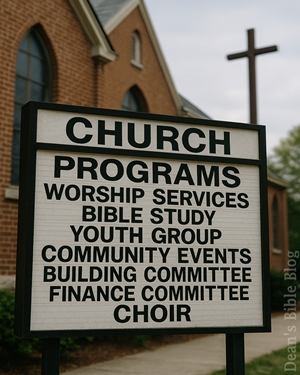What Is the Church Known For?

Many churches today are known for programs and committees, but the first-century church was known for Christ and Him crucified. This post calls the church back to repentance, faith, and the true gospel.
The first-century church had one clear message. Paul said, “For I determined to know nothing among you except Jesus Christ, and Him crucified” (1 Corinthians 2:2). That was their focus. It was not programs, not buildings, not numbers. It was Christ. His death. His resurrection. His saving power. That was the heartbeat of the church, and with that message alone they shook the world.
If you ask most churches today, “What are you known for in your community?” very few would say, “We are known for preaching Christ and the repentance of sin.” Instead, they will point to their youth programs, their food pantry, their family events, or their music. All of these may be good, but none of them are the gospel.
Ask them, “How many committees do you have?” and the list will come quickly. Finance, fellowship, missions, worship, youth, property, and yes—even the building committee. But if you ask, “How many people have repented of sin and come to Christ here this year?” most will have no answer.
The modern church has become skilled at organization. It knows how to run programs and manage activities. But too often it has lost the one thing that gave the early church its life—the message of Christ crucified.
Many pastors today are expected to be CEOs. They run programs. They manage committees. They oversee budgets, calendars, and building projects. They are often judged by how smoothly things operate or how many people fill the pews.
But the Bible paints a very different picture of what a pastor is called to be. Peter said, “Shepherd the flock of God among you, exercising oversight, not under compulsion, but voluntarily, according to the will of God; and not with greed, but with eagerness; nor yet as domineering over those assigned to your care, but by proving to be examples to the flock” (1 Peter 5:2–3).
Paul told Timothy, “Preach the word; be ready in season and out of season; correct, rebuke, and exhort, with great patience and instruction” (2 Timothy 4:2). The pastor’s job is not to keep the machinery of the church running but to feed the people of God with the Word of God. His duty is to guard sound doctrine, to care for souls, and to point people to Christ.
The early church never saw their leaders as administrators of programs. They saw them as shepherds, teachers, and watchmen. Leaders were not chosen for their charisma or business skills, but for their faithfulness to the truth and their ability to care for the flock.
Somewhere along the way, many pastors traded the pulpit for the boardroom. The biblical role of shepherd has been replaced with the modern role of manager. But when the shepherd’s voice grows faint, the sheep scatter.
The first-century church had no building committee. They had no programs to manage. They had no social calendar to keep. What they had was Christ. And that was enough. Their message was not about making life better, but about finding new life in Jesus. Their gatherings were not about filling time, but about filling hearts with truth.
The church today has a choice. It can be known for programs, for activities, and for committees. Or it can be known for Christ. Only one of those will change lives. Only one will save souls. Only one will stand when everything else falls.
So we must ask, not just as churches, but as believers—what are we known for? The church today does not need more committees, programs, or polished presentations. It needs to return to the one thing that made the first church unshakable—the message of the cross. Christ and Him crucified. Repentance and faith. That is the gospel. That is the power of God unto salvation. If the church will once again be known for preaching Christ and calling sinners to repent and believe, then it will have life, it will have power, and it will fulfill the mission God gave it. Nothing less will do.
“What I write is not for everyone, but what I write is meant for someone.” – Dean Butler
I am the author of two books: Embracing God's Wisdom: A Journey of Faith and Reflection and Embracing God’s Wisdom: Paul’s Commands for Victorious Living. Both are available on Amazon.
This work may be shared for ministry or personal use, but please credit the author when doing so. © Dean Butler – Dean’s Bible Blog. All rights reserved.
Please reach out at: hopeinchrist2024@yahoo.com
“I thank Christ Jesus our Lord, who has strengthened me, because He considered me faithful, putting me into service.” (1 Timothy 1:12)









